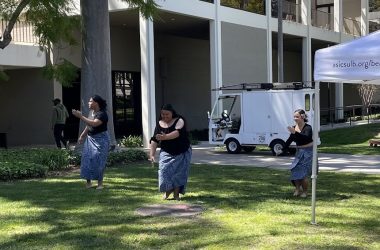Everyday, war and political information about Afghanistan and Pakistan is reported by the media, but many times people are left wondering what else is going on with those countries and their people.
Guest speaker and applied anthropologist Patricia Omidian marked the Center for Peace and Social Justice’s first event at Cal State Long Beach on Monday and Tuesday.
She has spent most of the last 10 years working with different nongovernmental organizations in Afghanistan conducting medical research on maternal and child health. Omidian’s research focused on females of child-bearing age and the different reasons for their mortality rates.
The purpose was to gather information about where and how to develop culturally appropriate health care for these women, such as waiting houses for pregnant women, where doctors would be immediately available for assistance.
She said Afghan women average 14 pregnancies in their life. The average age in Afghanistan is under 20 and the average lifespan is 42.
“Women in these areas have babies until they die,” Omidian said.
Because hospitals are not the most high-tech or sanitary in Afghanistan, she said that even if the family persists that the pregnant relative go to the doctor, women often decide to give birth in the home.
There is no tradition of midwives in Afghanistan, Omidian said, and usually the woman who would help give birth is the woman in the household who has had the most children.
Afghanistan has some of the worst figures for maternal mortality rates. Badakhshan has one of the highest rates in the world.
She said the cost of transportation and the chance of not living through the birth are both factors for why women choose not to go.
“The family without a mother is like a house without a roof,” she said.
She said the women would rather not risk leaving behind any financial burdens to the family, either. And even though “in Afghanistan nobody makes decisions about themselves, the family does,” Omidian said, women are allowed to choose to do the birth at home.
She said it is wrong to think the Afghans don’t care about their or their families’ health.
“I have seen cases where I see a man who carries their disabled child for days to get to a doctor,” Omidian said.
She was first in Afghanistan under the Taliban in the mid- to late ’90s.
Once the Taliban was removed, Omidian said, “you could taste the relief. … It was like a giant block party.”
But she said the hope quickly dried up, as Afghanistan and Pakistan are regions that have been in constant warfare since the ’70s.
She said that while no one there enjoys being under fire, most do not want the United States to abandon its occupation. She said many fear chaos and anarchy would rise again.
She did say, however, that things could have diverged from the way things are now if the U.S. had been more culturally appropriate and sensitive to Afghan culture.
“If they were to support the Afghans, it would look a lot different,” Omidian said.
At this point, even if the U.S. were to work harder at being more culturally applicable, she is “not sure it can be turned around.”
Omidian didn’t feel strongly about leaving Afghanistan until she realized how much her Afghan co-workers and friends would sacrifice for her. She said this was something she just wouldn’t allow.
She said, “I never felt in danger, but I decided to leave Afghanistan because I could never tell anymore if I was in danger.”
Omidian received her doctorate in medical anthropology from the joint UC Berkeley/UC San Francisco program in 1992 and is currently the medical anthropologist associate professor head for social sciences at Aga Khan University in Pakistan.
Joanne Tucker contributed to this article.



